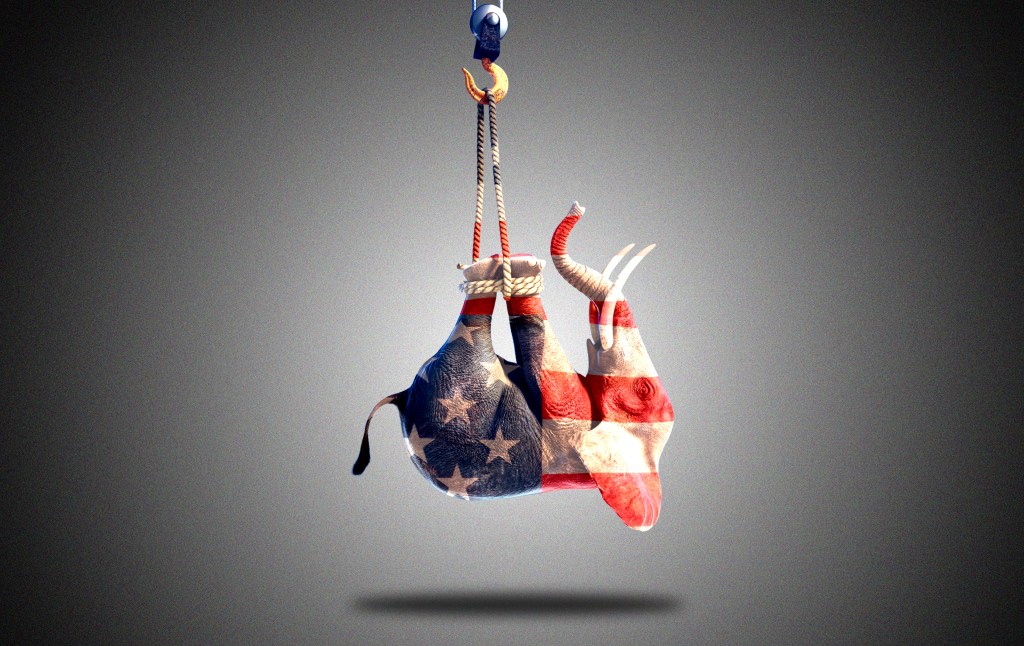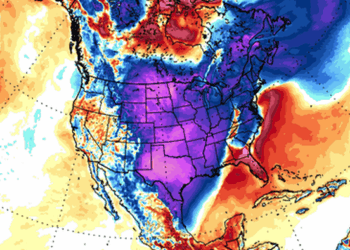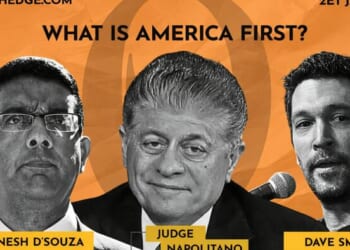
Could be. If I had to bet my savings on an outcome, I’d bet that the president’s age and health will leave him in no position to run even if he wants to. But the blithe assurances from Ruffini and Erickson would be more comforting if both hadn’t developed amnesia last year about Trump’s fitness for office after furiously demanding his impeachment and removal on January 6. (Ruffini greeted his return to office with one of the most embarrassing posts in the history of Twitter.) They had a powerful partisan motive to rehabilitate Donald Trump, so they reasoned, or “reasoned,” their way into doing so. Now they have a powerful partisan motive to believe that he surely won’t do the sort of thing they once briefly, and rightly, despised him for doing.
Maybe they’re right this time. But if you fear that the president really will try to run for a third term, there’s a powerful argument in your favor. He gained and then consolidated presidential power by taking political hostages; given his success with that tactic, why wouldn’t he try it again one last time in 2028?
Good for Trump.
It doesn’t surprise me that old-school party men like Ruffini and Erickson are cool to the idea of another Trump candidacy (for now!) while a burn-it-all-down “Leninist” like Bannon can hardly wait. The prospect of a third term is useful to the president and terrible for the GOP.
One virtue of the 2028 blather from Trump’s standpoint is that it boils America’s frogs a little longer. He’s trying to desensitize the country to executive power grabs through sheer repetition, a sort of authoritarian version of exposure therapy. The more comfortable voters get with the idea of him challenging some laws and traditional norms, the less resistance he’ll meet in challenging others. “Strong” presidents test the constitutional limits on their authority.
Murmuring about defying the 22nd Amendment reinforces that belief. Already, I think, we’ve reached the point where the prospect of him running again is less a matter of popular outrage than cause for excited will-he-won’t-he punditry. The rules shouldn’t apply to Trump is the president’s most heartfelt belief, and he’s gotten a considerable share of Americans to buy into it by simply refusing to accept that the rules apply to him. Barack Obama seeking an illegal third term in 2016 would have drawn Republican calls for impeachment; Trump seeking an illegal third term is just an “outsider” refusing to be bound by the rules of a corrupt system.
The other benefit of 2028 speculation is that it spares Trump from lame-duck status. There should be no duck lamer than an octogenarian serving out his second term, as any other president in that position would already face revolts among his congressional allies against the less popular parts of his agenda. His tariffs, for instance, should be ripe for bipartisan repeal given the damage they’re doing to the national economy and to certain red states in particular.
With rare exceptions, though, there’s no rebellion afoot in Republican ranks. No one wants to get crosswise with an imperial president who’s already goaded federal prosecutors into charging his enemies, but they really won’t want to get crosswise with him if there’s a chance he’ll still be president in 2029. The prospect of King Donald reigning for years to come, with increasingly autocratic powers amassed in the White House, means the House and Senate GOP dare not defy him for the sake of saving their own electoral skins. Members of the Duma understand that it’s always better to be too loyal to Putin than not loyal enough.
So “Trump 2028” is good for Trump. But it’s not so good for Trump’s party.
Bad for the GOP.
For starters, it’s terrible for J.D. Vance and anyone who might challenge Vance for the nomination.
So long as the president hasn’t firmly ruled out running again, Vance and the rest will need to defer to Trump’s wishes and not move forward with their own candidacies—or even act like potential candidates, lest they offend His Majesty with their presumptuousness. And given the president’s narcissistic compulsion for attention, that deference period could last longer than anyone expects. Republicans will want him to make a decision by 2027, but the siren song of suspenseful will-he-won’t-he speculation could drag his decision into 2028.
Imagine the Democratic field filling up after next year’s midterms and their candidates spending a year introducing themselves to the public while the GOP field remains frozen, languishing as Trump makes up his mind.
Eventually he’ll make a decision, and that’ll be terrible for Republicans too. If he drags his feet before opting not to run again, GOP presidential candidates will have relatively little time and opportunity to build their own independent political brands. And even if he opts out early-ish in the process, Trump will inevitably resent the media spotlight placed on the new nominee and will look for ways in his final year in office to reassert himself as the party’s (and America’s, and the world’s) main character. Having been denied the chance constitutionally to run again, he’ll police the nominee from the Oval Office for any deviations from his vision for the country.
All of which is fine for Republicans, I guess, if you think the rest of Trump’s presidency is likely to be a Reagan-esque success that leaves America hungry for four more years. But given the trajectory we’re on economically and civically, his successor being forced to run for what would essentially be Trump’s third term in a Trump-weary nation, with Trump himself repeatedly injecting himself into the campaign, isn’t the GOP’s ideal pitch.
And what if the president does decide to run? What if the fact that he’s already selling “Trump 2028” merchandise turns out not to be a “bit”?
The first thing that’ll do is awaken some Americans to the truth of the “No Kings” complaint. Diehard tribalists like Ruffini and Erickson will remain unreachable, but voters who came to the GOP late and aren’t invested in the party may find themselves shocked by the president’s autocratic pretensions the same way they’ve been shocked by some of his other policies. Seeking an unlawful third term will make Trump less popular, and less popular presidents have less political capital to spend.
Forget the 22nd Amendment, though. “Trump 2028” would have a problem more basic than that—namely, the president’s age. He’ll be 82 on Election Day 2028, older than Joe Biden was on Election Day 2024, and is already showing signs of diminution. Asking Americans to ignore a black-and-white constitutional rule about presidential term limits is one thing, asking them to ignore it on behalf of a candidate who’ll be closer to 90 than to 80 if he were to finish his third term is another.
The only thing Republicans worship more ardently than Trump is power. There’s a case to be made that, given his age, the president would be less likely to win the next election were he eligible and maintain the GOP’s grip on power than 44-year-old J.D. Vance would be.
Then there’s the legal-political nightmare that a Trump candidacy would foist on the party.
The GOP would be stuck backing a nominee who could and almost certainly would be disqualified by the Supreme Court, throwing the race into chaos. The court would obviously want to resolve the question of his eligibility as soon as possible to minimize the uncertainty, but it’s unclear to me if anyone would have standing to sue before the votes are in on Election Day. The 22nd Amendment says no one can be elected to the presidency more than twice, remember, not that no one can be nominated if they’ve been elected twice.
Would Republican voters want to go forward with a campaign led by someone who, even if victorious, would likely be barred from taking office? What if the court chose to hear the case early and disqualified Trump in, say, October 2028, giving Vance all of one month to introduce himself to voters? Why would a sane political party want to risk that instead of moving on from the president and holding a normal primary, especially after watching how a last-second switcheroo worked out for Democrats in 2024?
I suspect most Republicans won’t want to risk it, but they’ll have no choice. They’re hostages.
One last hostage.
Since 2015, right-wing politics has been a hostage crisis. Populists who care nothing for the party or its pre-Trump principles have taken the GOP captive and are forever threatening to shoot it by withholding their votes unless Republicans support Donald Trump in whatever he wants to do.
Populists don’t much care if Democrats win elections, but they know that zombie partisans like Ruffini and Erickson do, so they can name their price for their support. The price they demanded of conservatives after January 6 was letting their hero off scot-free for the insurrection, which is why Mitch McConnell and Senate Republicans contrived a lame procedural excuse to acquit Trump at his second impeachment trial.
The price populists will demand of the GOP establishment in 2028 is supporting Trump resolutely in his quest for a third term if he chooses to pursue it.
Some impressive rationale will eventually be concocted to explain why the 22nd Amendment shouldn’t apply, such as James Carville said something mean. Trump loyalists will expect Republican officials to amplify those claims, especially top-tier potential nominees like Vance and Marco Rubio. And they will amplify those claims, because that’s how hostage crises work: Vance, Rubio, and the rest of the GOP establishment will calculate that humoring Trump is a safer play than opposing him and making enemies of his MAGA base.
What’s the point of becoming the nominee over the president’s objections, Vance will reason, if his voters will punish me in the general election by staying home?
As the legal challenges to Trump’s candidacy play out, populists will warn Republicans not to undermine the president’s cause by offering themselves as just-in-case back-up candidates. The only way to pressure the courts to rule in Trump’s favor, they’ll argue, is to show them that the GOP won’t field a nominee if he’s disqualified. Judges won’t want to risk delegitimizing an American election by having a Democrat run in November 2028 without major-party opposition. They’ll cave, supposedly, if the right sticks with Trump and vows to accept no substitute.
The next step would be state Republican parties holding primaries in which Trump is the only candidate on the ballot—even if he’s already been disqualified by the courts. The people want four more years, populists will cry. The judiciary is thwarting our democratic will, never mind that the 22nd Amendment was ratified by two-thirds of both houses of Congress and three-quarters of the states. And again, establishment Republicans won’t resist lest they be accused by MAGA voters of assisting the effort to disqualify Trump.
There’s a timeline in which we enter the general election campaign with the president as the duly anointed Republican nominee yet legally barred from serving another term. Populists would mount a write-in campaign on his behalf, still believing that a forceful enough expression of popular support might scare the courts into relenting. Meanwhile, Republican leaders, state election officials, and judges would be forced to wrestle with what to do. Should Vance, Trump’s running mate, be listed as the nominee on state ballots? Should no one be listed? Should Trump be listed and all votes cast for him be deemed void? Or should those votes be counted, with Vance becoming president on January 20 instead of Trump in case Republicans win?
As Election Day approached, the GOP would be risking a fiasco. Vance, having become the new nominee, might split Republican votes with a Trump write-in campaign, dooming the party. Or maybe the president would finally be cajoled into withdrawing, but only after his diehard fans grew so embittered at the effort to block him that they resolved not to vote. Then, when Democrats won, practically every right-winger in the country would turn around and insist that the election had been “rigged” by the courts and therefore the new president was illegitimate.
All because Donald Trump refused to comply with one of the Constitution’s simplest and clearest commands.
We might end up with January 6 redux, except this time the MAGA stooges in government and the craven Republicans in Congress would be more willing to abet a White House plot to overturn an election on grounds of “unfairness” than they were the first time around. Even at this late stage of the process, the incentives on the right would continue to point toward collaboration: Any GOP lawmaker who opposed the scheme to keep Trump in office illegally would be marked for political, if not literal, death by populist hostage-takers.
It wouldn’t surprise me if that’s the mysterious “plan” to which Steve Bannon referred. The plan isn’t to concoct some ingenious legal strategy that will convince the Supreme Court to read presidential term limits out of the Constitution; perhaps the plan is simply to insist that the president should serve another term and to not back down an iota as institutional obstacles to that effort mount, until Trump feels enough right-wing support for the idea has gathered that he can get away with staging a proper coup to overcome his legal ineligibility.
The last Republican hostage crisis will end with a choice for right-wing partisans: You can have an intact GOP, or you can have an intact democracy. But you can’t have both.

















